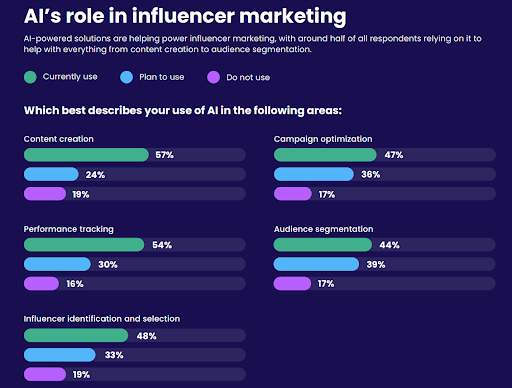The widespread adoption of generative AI technology is reaching every aspect of marketing strategies, from content to SEO to analytics and beyond. Influencer marketing is no exception.
Our new 2025 B2B Influencer Marketing Report finds marketers using GenAI for a variety of purposes in their influencer strategies, ranging from content creation — which leads the way at 57% — to more advanced applications like campaign optimization and audience segmentation.
Notably, those organizations with “very effective” influencer marketing strategies are 1.5x more likely to use AI for content creation, and 2x more likely to use it for the other uses mentioned.

This is a tricky area to navigate, with best practices still taking shape. You might wonder: Doesn’t the use of AI in influencer marketing kind of defeat the purpose, when authenticity and trust are the strategy’s driving forces? That’s an important question worth exploring.
Generative AI, influencer marketing, and authenticity
People trust people. They don’t trust faceless companies, and they certainly don’t trust robots. This underlying truth is what makes influencer marketing so effective, and underscores why marketers need to tread carefully when incorporating generative AI into their strategies.
Unique perspectives and advice, informed by real experiences and honed expertise, are the qualities that make influencer content valuable — to humans, to search engines, to social algorithms. Using generative AI in a way that detracts from these qualities is counterproductive at best. That’s not to say it doesn’t happen.
Lu Zhang wrote recently at Adweek about the rise of virtual influencers and AI avatars as brand representatives. It should go without saying how perilous this type of venture can be, threatening to evoke very negative reactions from your audience while offering little chance of resonance.
“My team’s research,” Zhang shared, “suggests that virtual influencers that present themselves as independent and authentic are especially poor at selling experiences, likely because consumers distrust virtual characters they know are preprogrammed yet pretend to have a mind of their own.”
Influencer marketing only works if it brings through the genuine credibility and voice of your influencer partners. With that in mind, let’s talk about generative AI and content creation.
Generative AI for content creation in influencer marketing
Nearly half of all respondents in the B2B Influencer Marketing Report (44%) named “the use of AI to expand and optimize influencer content” as the most important emerging trend in B2B influencer marketing today. Content creation was also the leading current use case for generative AI in influencer marketing, as mentioned above.
When we talk about using generative AI for content creation, we’re not talking about using AI to actually create the content. We know that takes away from the authenticity and impact. Instead, we’re talking about using generative AI to enhance and streamline the content creation process.
“It’s tempting to think that creators are pushing a button and getting [a] new video,” Amanda Ferrante of Code3 told Digiday. “But the applications today are often more subtle — use ChatGPT to generate script outlines or concept ideas, use auto-captioning tools, use Descript to edit a video using the transcript, use generative fill in Photoshop to add something to the background.”
Here are some other examples of beneficial ways to use generative AI for content creation:
- First drafts of influencer content. Oftentimes, influencers are subject matter experts in their fields but not writing experts. Using a platform like ChatGPT, they can enter inputs based on their own distinct experiences and perspectives, and then get help generating a first draft, which the influencer can then edit and refine around their voice.
- Tailoring content to different channels. Generative AI tools can quickly repurpose variations of an article or social post that are customized to different channels and platforms.
- Ideation and brainstorming. According to CMI’s latest benchmark research, brainstorming new topics is the No. 1 use of generative AI for technology marketers. Researching headlines and keywords is also high on the list. GenAI can help jolt creativity for you and your influencers by putting more ideas and possibilities in front of you.
- Creating data visuals. B2B influencers often discuss deep, complex topics. AI can help turn data into visually appealing charts or slides, helping their narrative hit home.
Other uses of generative AI in influencer marketing
Here are some other popular ways that generative AI tools are bringing efficiency and greater effectiveness to influencer marketing strategies.
Personalized influencer outreach
“When doing influencer marketing, the quality of the outreach is crucial,” Tom Pick, Senior B2B Digital Marketing Consultant, shares in the Influencer Marketing Report. “Failing to adequately and accurately personalize outreach is a great way to get your messages ignored or sent to spam.”
He adds that marketers can use AI to help quickly create personalized outreach without sacrificing the quality.
“By including everything you know about a particular influencer, as well as what
you’d like them to do, in an AI prompt, the tool (ChatGPT, Copilot, Jasper, etc.) can
suggest copy that’s personalized to the influencer,” Tom explains. “It can’t be used as-is (it will sound like AI-generated copy), but it provides a great start to work with.”
Performance tracking and measurement
More than half the respondents in the Influence Marketing Report (54%) said they are using AI for performance tracking, with another 30% planning to do so. Modern influencer marketing software and platforms are increasingly offering AI-powered features, with capabilities like automated dashboards, anomaly detection, qualitative engagement analysis, and more.
Our clients and friends at Sprinklr have been at the forefront of AI innovation, and they released a full report on the state of AI in influencer marketing, which is more B2C-focused but very insightful. The report covers emerging ROI and performance measurement techniques like social media sentiment analysis.
Influencer research and identification
Opinions are mixed on the value of AI for finding influencers. There are definitely advantages; nearly half of respondents in our survey (48%) said they’re using AI for this purpose. Through enhanced data analysis, pattern recognition, topic/sentiment analysis, and predictive analytics, AI technology can certainly play a role in narrowing down influencer lists or evaluating certain tangible criteria.
But in our experience, there are critical limitations to this approach, especially in B2B influencer marketing. Beyond the dependability of data being analyzed, AI has shortcomings pertaining to subjective context, nuance and strategic vision. For example, a niche influencer with a relatively small following but strong and highly relevant expertise might be perfect for your campaign, but could be overlooked by AI tools based on quantitative signals.
AI can be helpful for influencer identification, but only when guided by skilled human oversight.
Innovate your B2B influencer marketing
Generative AI and other technology advances are taking B2B influencer marketing strategies to new heights. Download the 2025 B2B Influencer Marketing Report for an in-depth exploration of tools and strategies that differentiate the best from the rest.



